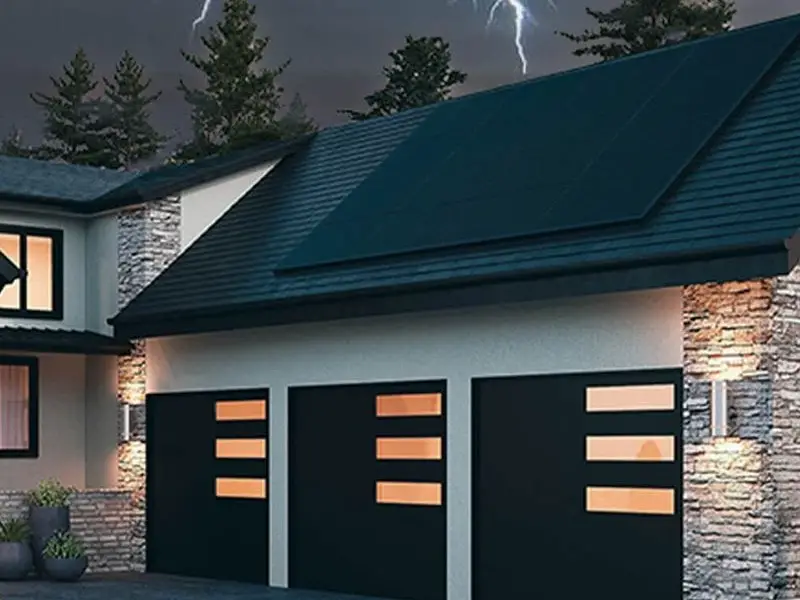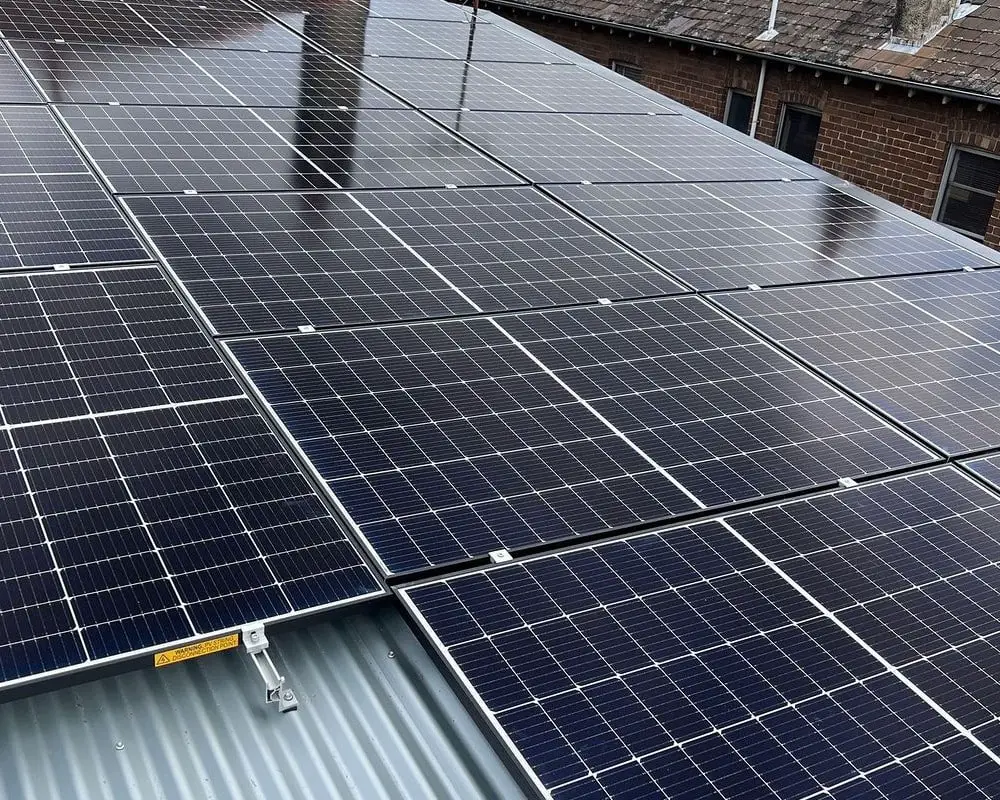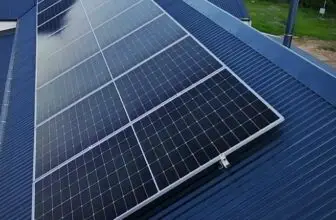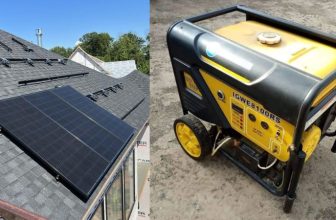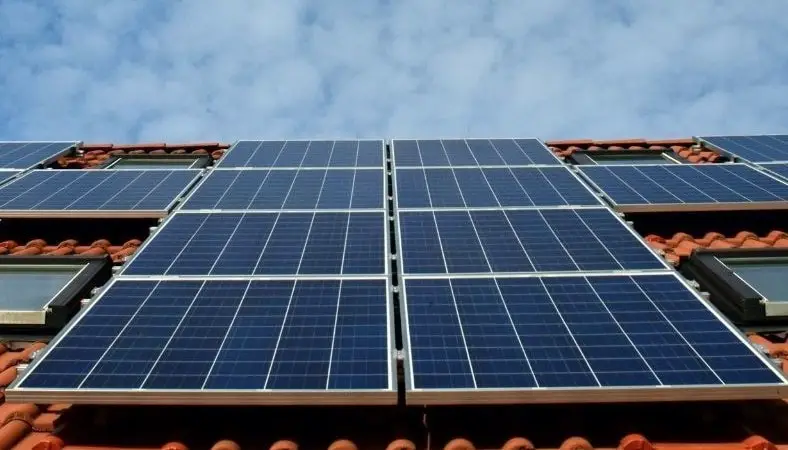
Solar panels capture sunlight and convert it into electricity. They are usually made of silicon, a material that is very good at absorbing sunlight. The efficiency of a solar panel is a measure of how well it can convert sunlight into electricity.
There are many factors that affect the efficiency of solar panels, including the type of silicon used, the thickness of the silicon, the amount of sunlight that the panel is exposed to, and the temperature of the panel.
The Principle of Work of Solar Panel
Contents
Solar panels convert light into electricity. They are called “solar” panels as they rely on sunlight to work. They are made up of an array of solar cells, also called photovoltaic cells. Each solar cell is made of two layers of semiconductor material, usually silicon. When sunlight hits a solar cell, it causes electrons to be knocked loose from the atoms in the silicon. The electrons flow through the solar cell and are collected at the metal contacts on the cell. This flow of electrons is an electric current, and when many solar cells are connected together in a solar panel, the current can be used to power electrical devices.
Solar panels are used in a variety of applications, from powering small electronic devices to providing electricity for homes and businesses. They are also used in large-scale power plants. Solar panels are an environmentally friendly way to generate electricity because they do not produce emissions of greenhouse gases.
Solar panels are most commonly made of silicon, but they can also be made from other materials, such as cadmium telluride (CdTe) or copper indium selenide (CIS). Solar cells are usually arranged in a rectangular grid on the solar panel. A typical silicon solar cell can convert about 15 percent of the sunlight that hits it into electricity. CdTe and CIS solar cells can convert about 20 percent of the sunlight that hits them into electricity.
What Does Solar Efficiency Mean?
Solar panel efficiency refers to the percentage of sunlight that is converted into electricity by a solar panel. The higher the efficiency, the more electricity the panel produces.
The efficiency of a solar panel is determined by the efficiency of its PV cells. PV cells come in a variety of types, with the most common being silicon cells. It is also affected by the type of material used to make PV cells. For example, thin-film solar cells are less efficient than silicon solar cells, but they are cheaper to manufacture.
Solar panel efficiency has improved significantly over the years. The first PV cells had an efficiency of about 4%. Today, the most efficient PV cells have an efficiency of around 40%.
There are a number of ways to increase the efficiency of solar panels. One is to use more efficient PV cells. Another is to use reflective materials to reflect more sunlight onto the PV cells.
Solar Cell Efficiency Formula
Solar panel efficiency output is calculated by taking the solar panel’s maximum power output and dividing it by the solar panel area calculation. The resulting number is the panel’s power density and is a measure of how much power the panel can generate per square meter.
Solar cell efficiency calculation can vary depending on a number of factors, including the type of solar cell used, the angle at which the panel is installed, and the amount of sunlight that the panel receives.
Most solar panels have an efficiency of around 15-20%, meaning that they can convert 15-20% of the sunlight that they receive into electricity. However, there are some panels that have efficiencies as high as 40%.
The standard solar power equation is:
Efficiency = (Power out from the solar cell) / (Power in from the sun)= ((Power out from the solar cell) / ((Area) x (1000))) x 100%
However, this calculation of solar panel efficiency only applies to solar cells that are exposed to the sun’s full spectrum of light. In reality, most solar cells only receive a portion of the sun’s light, due to atmospheric conditions or shading from buildings or trees. As a result, the actual efficiency of a solar cell is usually lower than the efficiency calculated using the standard formula.
How to Calculate Solar Panel Efficiency?
There are a few different things that affect solar panel efficiency, including:
- the quality of the solar cells;
- the size of the solar panel;
- the angle that the solar panel is installed;
- the amount of shading on the solar panel.
Quality
The quality of the silicon used in a solar cell affects its efficiency in two ways. First, silicon that is of a higher quality will have fewer impurities, which will allow it to absorb more sunlight. Second, higher-quality silicon will have a higher rate of electron-hole pair generation, which means that it will be able to convert more sunlight into electrical energy.
Size
The size of a solar panel can have a significant influence on its efficiency. Solar panels are typically made up of a series of solar cells, and the larger the panel, the more cells it can contain. The more cells a panel has, the more photons it can absorb, and the more electricity it can generate.
Solar panels are also typically more efficient when they are larger. This is because they have a larger surface area, which allows them to absorb more sunlight. They also have more space for the solar cells to be spaced out, which allows them to absorb more light.
Angle
The angle at which a solar panel is installed can have a significant impact on the panel’s efficiency. The most efficient orientation for a solar panel is one that faces the sun directly, with no obstruction from trees or buildings. In the northern hemisphere, this means the panel should be installed facing south. A panel installed at a latitude of 35 degrees south would be almost twice as efficient as the same panel installed at a latitude of 60 degrees north.
The angle of the panel also affects how much sunlight the panel receives throughout the day. A panel installed at a steeper angle will receive more direct sunlight during the day, while a panel installed at a shallower angle will receive more diffuse sunlight. The amount of sunlight a panel receives is a major factor in determining the panel’s efficiency.
The angle of the panel also affects the temperature of the panel. A panel installed at a steeper angle will be cooler, as it will be less exposed to the sun’s heat. A cooler panel is more efficient, as the heat generated by the panel can reduce the panel’s output
Shading
The efficiency of a solar panel is determined by the amount of shading it receives. Shading can come from trees, buildings, or other objects. It can also come from clouds or dust in the air. The less shading a panel has, the more efficient it will be.
The amount of shading also affects the temperature of the solar cells. If the cells are too hot, they will not work as well. The ideal temperature for solar cells is around 25 degrees Celsius.
Solar panels can be made more efficient by adding more solar cells, making the cells smaller, or using materials better at converting sunlight into electricity. However, these methods can also make the panels more expensive.
FAQ
What Color Roof Is Best With Solar Panels?
It depends on the specific circumstances of each home. Some factors to consider include the color of the house, the surrounding landscape, and the climate. In general, dark-colored roofs absorb more heat, which can increase the efficiency of solar panels. However, light-colored roofs reflect more light and may be more effective in cooler climates. Ultimately, the best color roof for solar panels is the one that works best for your home.
Do Solar Panels Make Your Roof Hotter?
No, solar panels actually make your roof cooler. The panels reflect sunlight away from your roof, which helps to keep your home cooler.
Do Solar Panels Work With Moonlight?
Solar panels work by collecting sunlight and converting it into electrical energy. They can also work with moonlight, but not as efficiently.
Conclusion
Solar panels are a perfect way to generate renewable energy and reduce carbon footprint. Moreover, they are a great way to save money on your energy bills. If you are interested in installing solar panels, please contact your local solar installer for more information.

